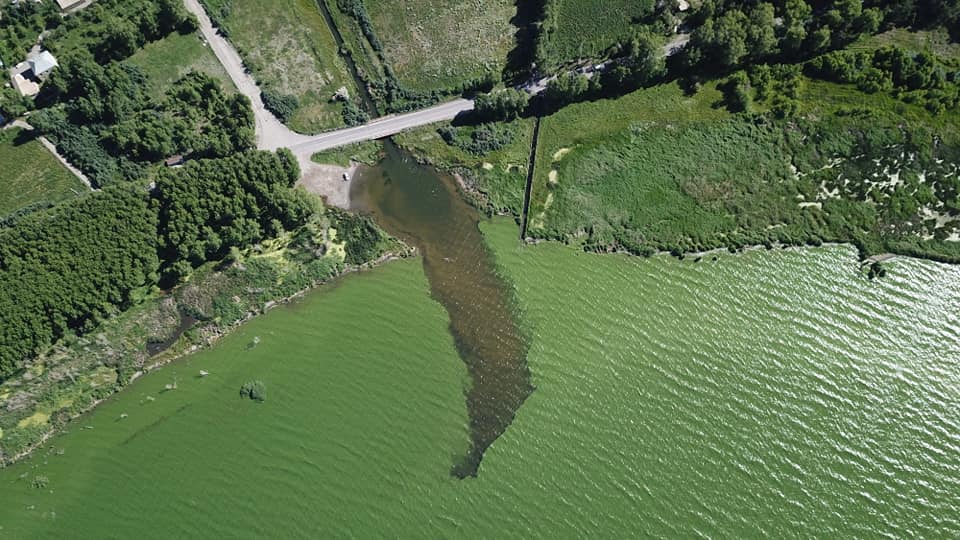Algae bloom threatens to turn Armenia’s Lake Sevan into a swamp

An algae bloom in Lake Sevan, Armenia’s largest freshwater reservoir, has local environmentalist sounding the alarm.
Experts say that in order to avoid waterlogging and parts of the lake becoming a swamp, the water level in the lake must be raised and modern treatment plants and reservoirs must be built.
• A bike trip across Armenia and Georgia
Environmentalists have been sounding the alarm since late June after an algae bloom has been recorded in the lake. This process has begun, the say, after:
• water being let out of the lake,
• the large number of tourists
• discharge of sewage and sewage waters from coastal recreation areas,
• use of artificial feeds containing nitrogen and phosphorus by fisheries,
• accumulation of these substances at the bottom of Lake Sevan.
The drainage of sewage into the lake was confirmed on July 4 by the Minister of the Environment of Armenia Erik Grigoryan, who despite this says that “in its current state, the water of Sevan is suitable for drinking.”
“Global warming, temperature, and poor climatic conditions are also factors affecting the lake. There are also blue-green algae in Lake Baikal and the Black Sea”, the minister said.
Journalists reminded the minister of an incident that occurred in 2018 to the director of the National Park Sevan: in the summer of 2018, due to a similar increase in algae, environmentalists again sounded the alarm about the dangers of bathing and drinking lake water. In order to prove that Sevan water is safe, the director of the park, Vahe Gulanyan, publicly drank a glass of water from the lake.
Armenian media wrote that the director afterwards was taken to the hospital. But the minister did not confirm this information:
“As far as I know, he did not go [to the hospital.]”
Regarding the algae bloom, Grigoryan, referring to the opinion of experts, noted that “the green color of the lake will disappear within ten days.”
Grigoryan says the whole marshland of the lake was studied by two professional groups:
“This is about 770 hectares of land. This year a tender has already been announced to clean these areas. We will do more than planned. In 2020-2021, this whole area will be completely cleared.”
Grigoryan also said that in the next two to three years the water level of the lake will be significantly increased.
Expert opinions
Environmentalists believe that the flowering of Sevan may indicate the presence of toxic elements in the water.
Senior Researcher of the Institute of Hydroecology and Ichthyology of the Academy of Sciences of Armenia Lusine Gambaryan believes that the blooming algae in the lake constantly accumulate toxins:
“Such water cannot be used for irrigation or for breeding fish and crayfish, since harmful substances can be ingested with food and water. The most dangerous is the presence of microcystin. It is believed that algae blooms are associated with global warming. Yes, but temperature is just one of the reasons. The main reason is the presence of nutrients in the water. This has led to an increase in algae, which absorbs a large amount of oxygen.”
Civil organisations join in the fray
Member of the S.O.S. Sevan initiative group Silva Adamyan believes that Armenia may lose its “pearl” in the near future if its attitude to the problems of the lake does not change.
Adamyan explains this by the fact that the water quality is deteriorating, and faster than expected.
Levon Galstyan, representative of the Pan-Armenian Ecological Front, stated that in recent years the attitude towards Sevan has been ‘criminal.’
“All specialists who have given positive conclusions on the state of the Sevan ecosystem, and all officials who made decisions, should be responsible for their actions.
“General mobilization is needed, preferably on the order of the Prime Minister, in order to carry out large-scale cleaning work, after which work should be started to raise the water level. In addition, there is no single database on the state of Sevan. There is no public control that can be a serious deterrent to the commission of such crimes.”


















